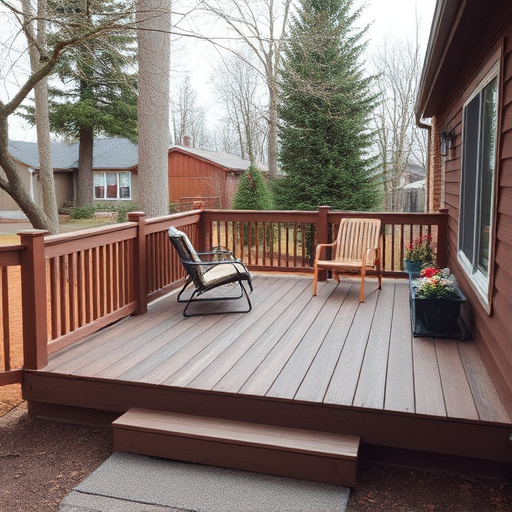Deck sealing is key for preserving outdoor spaces, with oil-based and water-based sealers as primary options. Oil-based sealants offer deep wood penetration, high durability, and enhanced color but can be messy and strongly scented; while water-based alternatives are eco-friendly, faster drying, and popular for residential projects due to ease of application and low fumes. For commercial settings, oil-based sealants stand out for their superior protection against harsh weather, foot traffic, and chemicals. Water-based options, gaining popularity, provide good water damage resistance but may not last as long in extreme conditions. Choosing between them depends on priorities like eco-friendliness, drying time, odor, durability, and frequency of reapplications; for high traffic or extreme climates, oil-based sealers are preferable.
Looking to protect your deck? Understanding the difference between oil-based and water-based deck sealing products is key. This comprehensive guide breaks down each type’s unique definition, advantages, and disadvantages. From durability and weather resistance to application ease and user experience, we delve into what makes these sealers tick. Discover which option aligns best with your needs for long-lasting, high-performance deck protection.
- Understanding Deck Sealing Products: Oil-Based vs Water-Based
- – Definition and characteristics of each type
- – Advantages and disadvantages overview
Understanding Deck Sealing Products: Oil-Based vs Water-Based

Deck sealing is a crucial step in maintaining the beauty and durability of your deck. When it comes to choosing the right sealer, understanding the key differences between oil-based and water-based options is essential. Both types serve the primary function of protecting wood decks from the elements, but their formulations and applications differ significantly.
Oil-based sealers, often derived from natural oils, are known for their rich color enhancement and high durability. They penetrate deep into the wood, offering excellent protection against moisture and UV rays. However, these products can be more challenging to clean up during application and may emit strong odors. On the other hand, water-based sealers are eco-friendly alternatives that dry faster and produce fewer fumes, making them a popular choice for residential roofing and siding installation projects. While they might not provide the same level of color enhancement as oil-based options, water-based sealers are generally easier to apply and offer a more even finish, especially in terms of deck sealing. This makes them an attractive choice for homeowners looking for a low-maintenance solution without compromising on protection.
– Definition and characteristics of each type

Oil-based deck sealing products are known for their superior durability and long-lasting protection against harsh weather conditions. They form a thick, protective barrier on the deck surface, making them ideal for areas with high foot traffic or exposure to chemicals. These sealants are typically greasy to the touch and offer excellent resistance to stains and UV damage. Oil-based options are often preferred in commercial settings due to their robust performance.
Water-based deck sealing, on the other hand, is an environmentally friendly alternative gaining popularity. These sealants use water as a solvent, making them less toxic and easier to apply compared to oil-based products. They offer good protection against water damage but may not last as long in extreme conditions. Water-based sealers are suitable for residential decks and provide an appealing finish that enhances the overall look of exterior home improvements, including siding services. Home service solutions often recommend these for customers seeking a low-maintenance, eco-friendly option without compromising on deck sealing effectiveness.
– Advantages and disadvantages overview

When comparing oil-based and water-based deck sealing products, understanding their distinct advantages and disadvantages is key to making an informed decision for your decking needs. Water-based sealants offer several benefits, including lower odor, faster drying times, and minimal environmental impact due to their solvent-free composition. They’re ideal for those prioritizing eco-friendliness and quick turnaround times between applications. However, water-based products may not provide the same level of durability as oil-based alternatives, which are renowned for their exceptional protection against harsh weather conditions and UV rays.
On the other hand, oil-based sealants boast superior longevity and protection, making them a preferred choice for high-traffic areas or decks in regions with extreme climates. Yet, they tend to emit stronger odors and take longer to dry, which can extend project timelines. Moreover, some oil-based products may require more frequent reapplication compared to their water-based counterparts. For homeowners considering a roof replacement or siding installation, understanding the interactions between these materials and deck sealing is essential to ensure long-lasting protection for all exterior surfaces.
When choosing a deck sealing product, understanding the nuances between oil-based and water-based options is essential for an effective seal. While oil-based sealers offer rapid drying times and superior stain resistance, they can be more toxic and difficult to clean. On the other hand, water-based sealers are environmentally friendly, easy to apply, and quick to dry, making them a popular choice for modern decking. Ultimately, the best option depends on individual needs, preferences, and priorities, ensuring a durable and attractive deck finish.














